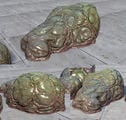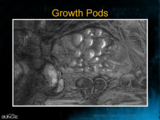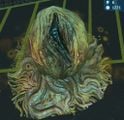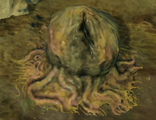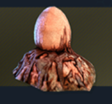Flood blister
From Halopedia, the Halo wiki
Template:Flood Species Infobox Flood blisters[1] also referred to as Flood Eggs[2] or Flood Growth Pods[3] are large, bulbous Flood growths that form on walls and floors, and particularly on surfaces covered with Flood biomatter. They are only seen during advanced stages of Flood infestation, when a Gravemind has formed and consumed enough flesh to create a Flood hive and support Pure Forms.[4] They have no means of defense, but if ruptured, they explode and release their infectious spores and their Infection Forms. Non-sentient animals or corpses not harnessed for combat forms are seeded with Flood cells and transformed into infection form-filled sacs. These diseased growths are one of the most pernicious aspects of the Flood, and a single spore could potentially transform an entire planet's biosphere into quivering masses of diseased mucus and bile if left unchecked.[1]
Gameplay
In Halo 3, blisters were encountered in the Campaign levels Floodgate and Cortana, and in the multiplayer maps Isolation and Cold Storage, though the multiplayer blisters do not release Infection Forms.[5]
In Halo Wars, the Flood blisters are called Flood Eggs. They serve as double-edged swords; shooting these pods will sometimes releases precious resources but other times, they will release either a swarm of Infection Forms or a Flood Spore cloud, both of which can destroy infantry squads in seconds.
In Halo Wars 2, Flood blisters can be encountered in the Awakening the Nightmare campaign. They will detonate if any units get near them, releasing their payload of Pod infectors, but can also be destroyed from afar with weapons fire.
Trivia
- Hitting the pods with flame-based weaponry will cause the pod to burst, but not release Infection Forms. It could be possible that the Infection Forms that are supposed to emerge burst along with the pod but it is so quick that it looks like one simultaneous explosion.
- On Cold Storage, it can be seen that they adhere to surfaces using suction-cup-like appendages.
- If a pod carries enough Infection Forms, then each individual flood can be seen on your motion tracker.
- Flood blisters were first named in the Phoenix Logs of Halo Wars 2: Awakening the Nightmare. Prior to this, their only known name had come from Halo 3 concept art, where they were referred to as Flood Growth Pods.
Gallery
Growth pods within the crashed Indulgence of Conviction.
Concept art of the Flood egg for Halo Wars 2.
List of appearances
- Halo 2 (First appearance)
- Halo 3
- Halo Wars
- Halo Legends
- Halo Wars 2
Sources
| |||||||||||||||||||||||||||||||||
